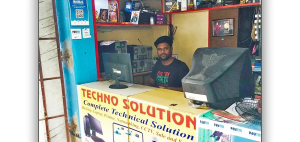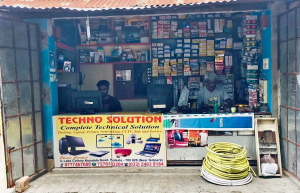People of Bharat: Ajay Kumar Dey, Kolkata
Walking along the streets of Kolkata’s South end settlements, I come across a shop run by two men; one of them sitting at a desktop. Finding it highly unusual to find a desktop in a street shop, I approach them and strike up a conversation with the younger-looking one among them.

I learn this particular shop is owned by Mr. Dey, an electrician and his son Ajay, a computer hardware technician. The shop itself is divided between father and son for each of their businesses. There is one wall with mounted shelves running along the back of the shop and one long table at the front end. One half of the shelf is stacked with electrical equipment such as lightbulbs, wires and cables and other odds and ends. The other half holds more sophisticated electronic equipment such as laptop battery chargers, cables and plug-ins for desktops, and computer hardware. Ajay mans one half of the table while his father uses the other half. Ajay sits in the front of the shop, where a banner covers his half of the area and highlights his contact details. At 24, Ajay is in his prime, while his father Mr. Dey is in his late fifties. Average height with a wheatish complexion, Ajay is unshaven but wears a pair of jeans and a T-shirt. I chat with Ajay while his father fiddles around with a circuit board — oblivious to our presence.

Ajay tells me he was born and brought up in Kolkata to a Bengali family. Ajay and his elder sister live with their parents in a four-room residence on the street. One of the rooms opens up on to the street and serves as the shop that is owned by Mr. Dey and run by him and his son. Ajay’s father is an electrician and made a living all his life out of this trade while his mother was a housewife. Initially, Mr. Dey’s electrician business did well and the family prospered, but over years it got deteriorated. Ajay ascribes this to severe competition and technological advances.
Ajay completed his graduation and enrolled in a course in ‘Hardware and Networking’. After completing the course, he formally started his own business ‘Techno Solutions’ around the year 2018. As part of his course completion he was required to have some field training. The money he earned from his field trips he saved up and used it as capital to start up on his own. Ajay tells me he didn’t want to do a regular 9 to 5 job and is not hankering after government jobs like others his age.
Ajay makes about Rs. 7–10,000 in profits on average every month from servicing computer hardware. He reinvests his profits back into his business and procures his raw material from local distributors from the ‘Chandni market’ close by. He gets customers through word of mouth and has also invested in promoting his business on internet yellow pages platforms such as ‘JustDial and Sulekha.com’ (internet yellow pages websites). He confesses these bring him only a handful of customers. Ajay charges Rs. 200 for servicing laptops and Rs. 300 for desktops within a travel range of 2 to 5 kilometers, hiking the rates by Rs. 100 to Rs.150 for distances between 5 to 10 kilometers. He travels around on his motorbike and spends an average of Rs. 1000 on monthly petrol costs. Ajay tells me his father and his sister contribute to the household income as well. Together, they spend Rs. 7000 on groceries, Rs. 3000 on utilities and Rs.1500 on health related expenses. Neither of them have a life insurance but each has their own bank account. The family collectively saves Rs. 5000 every month which is deposited in the bank. His family’s total savings currently amount to Rs. 30,000 — last year the family spent about the same amount on renovations for the house.
Ajay has no intention of trying a hand at other livelihood option unless he can clearly see a better source of income. Currently, he manages the business on his own but would employ another person if he needed to expand operations. Ajay understands the power of the internet and explains how he promotes his business online. ‘Shob ee marketing er opore nirbhor kore (Everything in business depends on marketing),’ he says. He pays Google Search Advertisement Packages to have his service listed as the top three to five names on the internet directory for customers searching for related services on ‘Just Dial’ and ‘Sulekha’.
Ajay owns a smartphone which he bought for Rs. 7000 from his own savings. He uses it for entertainment and social media posts on Facebook and WhatsApp. He uses YouTube to learn about the latest computer technology and often relies on videos to solve hardware problems. He explains how in his line of work, he needs to remain updated — ‘technical jinish keu bolte parbe na je she shob jaane(complete technical knowledge is unattainable),’ he adds reflecting. Ajay is comfortable making online payments and regularly uses IMPS and NEFT money transfer options to send and receive payments. ‘A modern technician should explore the internet,’ he says nonchalantly.
Ajay dreams of someday owing his own flat and a car. He wants to expand his business to employ 5 people under him in the next 10 years. At present he worries about the fluctuating demands of his business. Ajay comes across to me as confident with a strategic approach to business. I am suddenly aware of his father’s presence a couple of meters away from us. I wonder what his father thinks of Ajay’s venture. I wonder if a younger Ajay tried convincing his father to ‘update’ while he watched the business slip away. I wonder if this shop shared by father and son is a compromise for a changing relationship or a respect for each other’s space and abilities. To me, Ajay’s father represents a past marked by steady, unchanging principles — characteristic of an elder generation in India today while Ajay represents the future; hopeful and optimistic in the face of uncertainty. Suddenly I am reminded of a 1971 movie ‘Kal, Aaj aur Kal’ (Yesterday, Today and Tomorrow) about the classic conflicts across different generations.
I see ‘Yesterday, Today and Tomorrow’ here — sharing a shop, a table and working side by side at the tedious task of eking a living.
This research was developed as part of the Bharat Inclusion Initiative.
